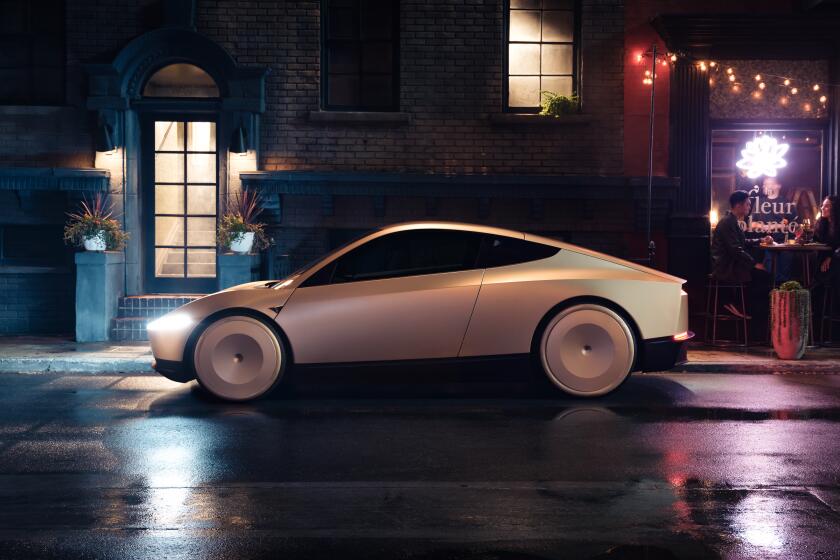U.S. agency launches investigation into Tesla’s self-driving technology

- Share via
Tesla’s controversial “Full Self-Driving” mode is being investigated by U.S. authorities after a series of crashes, including one accident that killed a pedestrian.
The National Highway Traffic Safety Administration opened its latest probe into the leading maker of electric vehicles after receiving reports of four collisions that occurred while drivers were allowing their cars to pilot themselves in low-visibility conditions including fog, airborne dust and sun glare. The investigation, which was announced Thursday, involves the autonomous driving technology installed in more than 2.4 million vehicles.
Depending on the outcome, the investigation could be a precursor to NHTSA issuing a recall of the vehicles if the agency finds they pose an unreasonable risk to safety.
The probe comes a week after Tesla Chief Executive Elon Musk unveiled prototypes of the Cybercab, a taxi that Musk claims will be fully autonomous, with no gas pedals or steering wheel.
While Tesla has banked its future largely on the success of the Cybercab, the company’s failure so far to develop technology needed for a fully self-driving vehicle has left many skeptical about its ability to compete in the burgeoning field of robotaxis. Already, it has fallen behind another company, Waymo, which has launched a fleet of driverless vehicles in San Francisco and Los Angeles.
Tesla did not respond to requests for comment regarding the NHTSA investigation.
Elon Musk unveiled the Cybercab on Thursday night at a highly anticipated event, where he also showed off new protoypes of a robovan and humanoid robot.
Musk has come under criticism for his promises and claims about the capabilities of Full Self-Driving, which the company has been selling to customers for several thousands of dollars since 2020. Despite his saying that it will soon be complete, the tech is still not capable of operating without an alert driver at the wheel who is ready to intervene if necessary.
In May, a Tesla in FSD mode nearly hit a moving train after failing to detect the locomotive. The driver hit the brakes and accepted responsibility for the accident, but told NBC News he believes FSD is a defective product.
“Tesla has said that a human driver needs to be more attentive, not less attentive, when using this feature,” said Bryant Walker Smith, an associate professor of law at the University of South Carolina who specializes in emerging transportation technology. “Yet it is the very system that the Tesla CEO has for many years indicated would be imminently capable of automated driving.”
Tesla has twice recalled Full Self-Driving under pressure from NHTSA, which in July sought information from law enforcement and the company after a Tesla using the system struck and killed a motorcyclist near Seattle.
The recalls were issued because the system was programmed to run stop signs at slow speeds and because the system disobeyed other traffic laws. Both problems were to be fixed with online software updates.
Critics have said that Tesla’s system, which uses only cameras to spot hazards, doesn’t have proper sensors to be fully self-driving. Nearly all other companies working on autonomous vehicles use radar and laser sensors in addition to cameras to see better in the dark or in poor visibility conditions.
In the current investigation, NHTSA is looking into “the ability of FSD’s engineering controls to detect and respond appropriately to reduced roadway visibility conditions,” according to agency documents.
Musk did not specify if FSD is used in the Cybercab, which he said would be commercially available by 2027. Several Cybercabs completed short trips on closed roads earlier this month at a highly anticipated unveiling event at Warner Bros. Studios in Burbank.
The controversy around FSD, which is likely to raise more doubt about Tesla’s ability to soon deliver safe, autonomous driving technology, could become a drag on the company’s stock, which closed Friday at $220.70, down 11% from the start of the year.
“Tesla’s valuation is much higher relative to their revenues and their profits, and that is almost entirely based on the presumption that they will suddenly start generating mountains of new profits” through the Cybercab, said Sam Abuelsamid, a transportation analyst at Guidehouse Insights.
“Investors have clearly been very excited about this for many years even though Tesla hasn’t delivered on it,” he said.
The Associated Press contributed to this report.
More to Read
Inside the business of entertainment
The Wide Shot brings you news, analysis and insights on everything from streaming wars to production — and what it all means for the future.
You may occasionally receive promotional content from the Los Angeles Times.












